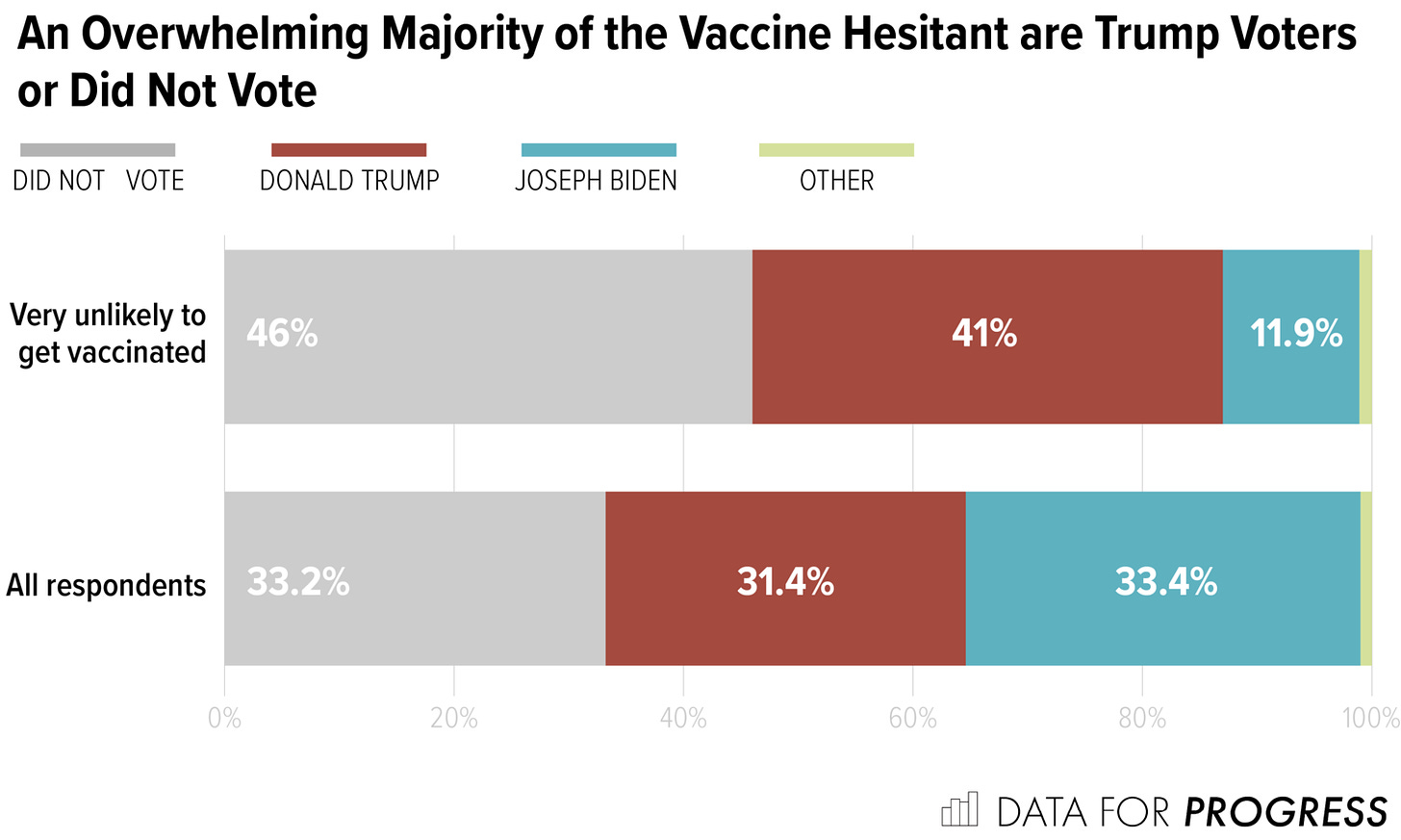Polls show non-voters, not Trump voters, make up the largest share of vaccine-reluctant Americans
Luckily, they are also particularly responsive to monetary incentives to get shots
If you’re coming into the data cold, you might think that Trump voters make up the majority of Americans who say they will not get vaccinated for covid-19. That is a reasonable assumption; We know that that conspiratorial thinking about covid-19 is more prevalent on the right, and Republicans were much more likely to stage protests against covid-19 lockdowns last year than Democrats were. And while in office, Donald Trump encouraged both the covid skeptics and protestors. The logical extension of these data is that his voters would be the least likely to believe in vaccinations, too.
But you would be wrong if you thought this. Not, like, in a “ha-ha, dummy” way that implies Democrats don’t like vaccines either; From modeling individual responses to polling data I have found membership in the Republican Party to be the most significant predictor of vaccine hesitancy, more powerful than any other demographic or political trait. No, the point is instead that there is a third group of people that have been flying under the radar: non-voters. I think this may surprise people, so it’s worth a few comments.
First, the data. A poll from Data for Progress released this week found that non-voters make up a near-majority of Americans who say they are “very unlikely” to get vaccinated. Comparatively, they make up just 33% of all adults. Although Trump voters are also disproportionately represented among vaccine-reluctant Americans, they are slightly less overrepresented than non-voters.
A poll from YouGov also found something similar.
We can use these data to speculate about why this surprising pattern might crop up in the numbers. I have a few suspicions that could help connect the dots. The overall story is that the things correlated with political activity are also correlated with getting vaccinated.
First, YouGov’s numbers show that non-voters are less likely to pay attention to news and current events than voters. So they may have been less likely to see announcements of nearby clinics — or, perhaps more plausibly, to see messages from their political leaders urging them to go out and get their shots. Non-voters also have weaker ties to political groups, so those messages would be less predictive of future behavior even if they did hear them.
Then, there are a lot of demographic and geographic confounders to consider. Data for Progress ran a few models on their poll and found that vaccination rates are lower in cities, among voters without college degrees, among non-whites and among young people, all else being equal. All of these things are also correlated with political activity. Voter turnout is higher among the elderly; so are vaccination rates. Turnout is lower in rural areas; same with vaccinations for covid-19. And so on.
. . .
What can be done about increasing vaccination rates? Luckily vaccine-hesitant non-voters also seem particularly responsive to monetary incentives to go get jabbed. The Economist’s write-up of the YouGov poll noted the following numbers:
Why are the politically disengaged more responsive to financial vaccination incentives? One potential explanation is that their opinions are more flexible in general. Among all non-voters in YouGov’s poll, 18% say they were not sure about getting vaccinated, whereas only 5% and 10% of voters for Messrs Biden and Trump, respectively, were undecided.
Sadly, the Economist/YouGov poll also revealed that only about 10-15% of people who currently say they “will not” get vaccinated would respond to monetary rewards for getting shots. That number is higher — at 20% — for non-voters. But the final point here is that the factors that lead to hard opposition to vaccines also make people less receptive to pro-vaccine messaging from people or institutions in positions of authority.




